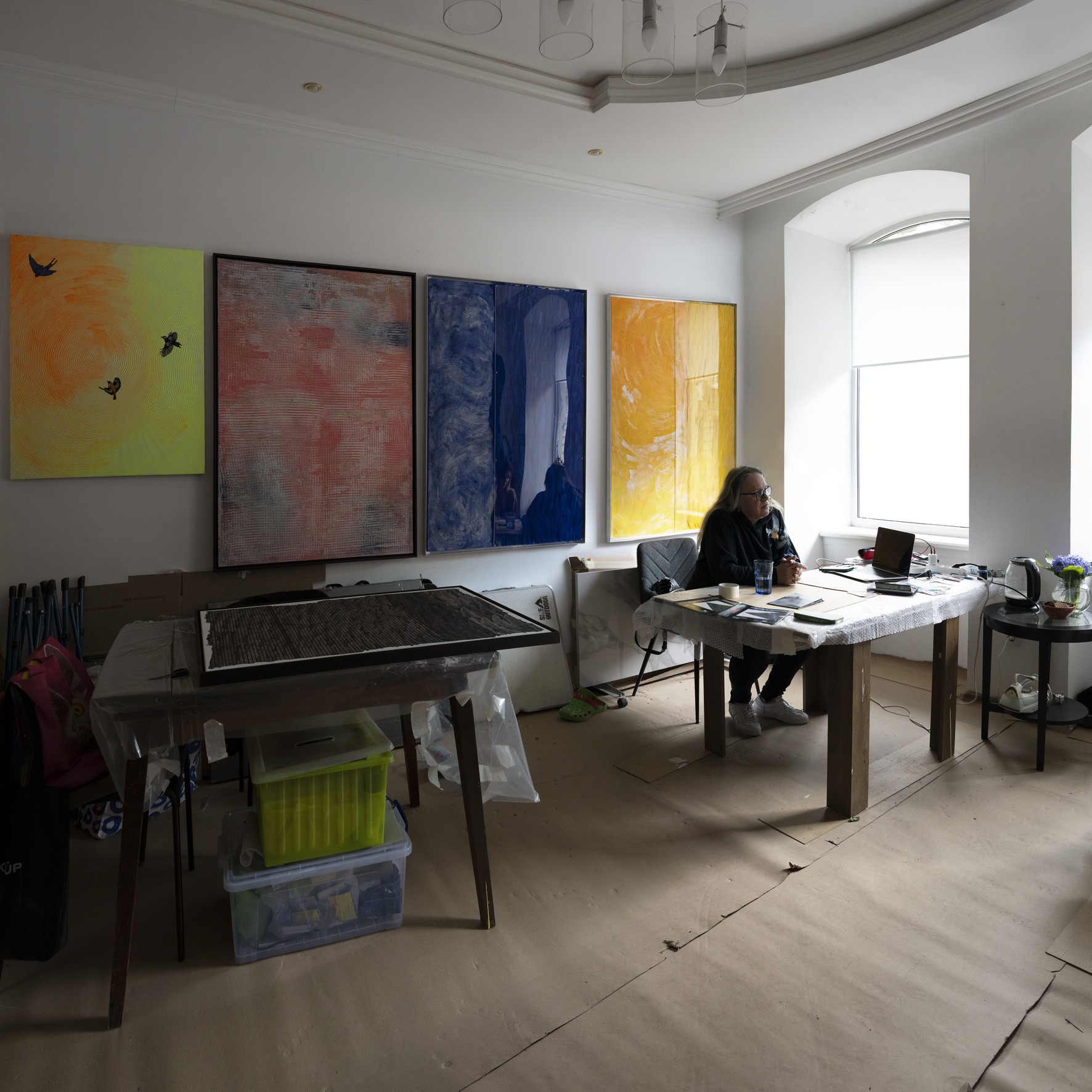Антоніна Денисюк
Antonina Denisiuc
«Бути далеко від дому під час війни означає постійно пояснювати очевидне й проживати війну в ізоляції. Навіть на відстані біль не відступає, він лише стає глухим і важким, бо ніхто не може розділити його повністю».

З серії «Before the Future», 2025
Друк на Hahnemuhle Photo Rag Metallic, Dibond
Антоніна описує війну як досвід, що різко прискорив життя – власне, й людей навколо. Це не метафора, а фізичне й емоційне виснаження на четвертому році повномасштабної війни: втома, відчуття тілесної крихкості, щоденний стрес. Молоді обличчя, постави й голоси змінюються.
Втрата знайомих стала буденністю. На вулиці, де живе художниця, майже щодня проходять похоронні процесії військових. Друзі гинуть не лише на фронті – дехто не витримує психоемоційного тиску війни. У якийсь момент стрес досяг такої сили, що сама Антоніна почала затинатися.
Цей досвід переплітається з родинною пам’яттю: бабуся пережила Другу світову війну, мама народилася під час подвійної окупації Львова. Тож коли у 2022 році почалося повномасштабне вторгнення, було зрозуміло, що війна триватиме довго.
Перші місяці дім перетворився на прихисток для 14 біженців і 4 котів. Спільний побут, тривожні ночі, турбота одне про одного стерли межі між приватним і спільним. Тіло, час і простір перестали належати лише собі. Водночас саме турбота, маленькі ритуали та буденні дії стали точкою опори.
Деякий час Антоніна провела за кордоном – у майстерні в Берліні, згодом у Цюриху разом із менеджеркою та донькою Ганною Гуменюк. Там вони зі швейцарським меценатом створили галерею «Капуста» і провели понад сім виставок та благодійних аукціонів на підтримку українських митців та армії. Але щоночі в Цюриху сон приходив лише після перевірки новин і повітряних тривог в Україні. Усвідомлення, що найбільш корисною зараз можна бути лише на Батьківщині, зробило повернення до спільноти єдиним можливим вибором – глибоко емоційний акт, де все зрозуміло без слів.
У Львові стало очевидно, що війна змінила розподіл ролей у культурному середовищі. Коли багато чоловіків мобілізовані, жінки беруть на себе відповідальність за збереження культурної тяглості, волонтерських ініціатив і публічного представлення України.
Для Антоніни творчість стала способом утримувати стабільність – щоденною практикою, яка під час війни набула ще більшої системності.
Свобода і воля тут – не лише мистецькі категорії, це українське загальносуспільне явище. У роботах, створених у цей період, прагнення до життя втілюється у яскравих барвах, що нагадують про мирне небо. Трансформація матриці, яку зараз переживає Україна, що є причиною каталізування всіх українських суспільних процесів, стане по-справжньому зрозумілою лише з часом.
‘Being far from home during wartime means constantly explaining the obvious and living through the war in isolation. The pain doesn’t subside with distance — it only becomes muted and heavy, because no one else can fully carry it with you.’
Antonina describes the war as an experience that has drastically accelerated life — her own, and that of everyone around her. This is no metaphor, but a physical and emotional exhaustion that defines the fourth year of full-scale war: fatigue, a sense of bodily fragility, and daily stress. The faces, postures, and voices of young people are changing.
The loss of friends has become routine. On the street where the artist lives, military funeral processions pass by almost daily. Friends are dying not only on the front lines — some can no longer endure the psychological pressure. At one point, the stress became so overwhelming that Antonina developed a stutter.
This experience is deeply interwoven with family memory: her grandmother survived the Second World War, and her mother was born during the double occupation of Lviv. So when russia launched its full-scale invasion in 2022, it was clear to Antonina that the war would be long.
In the early months, her home became a shelter for 14 displaced people and 4 cats. Shared routines, sleepless nights, and caring for one another blurred the boundaries between private and communal life. Her body, time, and space no longer belonged solely to her. And yet, it was in the acts of care, the small rituals, the daily gestures, that she found grounding.
For a time, Antonina lived abroad—first in a studio in Berlin, then in Zurich, where she worked with her manager and daughter, Hanna Humenyuk. There, with a Swiss patron, they founded Kapusta Gallery, organizing over seven exhibitions and charity auctions in support of Ukrainian artists and the army. But even in Zurich, sleep came only after checking the news and air raid alerts in Ukraine. The realization that her most meaningful contribution could only happen at home, returning was the only option — a deeply emotional decision that required no further explanation.
Upon returning to Lviv, it became clear that the war had reshaped cultural dynamics. With many men mobilized, women have taken on the responsibility of sustaining cultural continuity, leading volunteer initiatives, and publicly representing Ukraine.
For Antonina, art became a stabilizing force — a daily practice that, under wartime conditions, acquired new structure and necessity.
Here, freedom is not just a concept in art — it’s a collective experience. Her works from this period radiate a vivid desire for life, often conveyed in vibrant colors that recall peaceful skies. The transformation Ukraine is undergoing now — the upheaval that accelerates every social process — will only be truly understood with time.